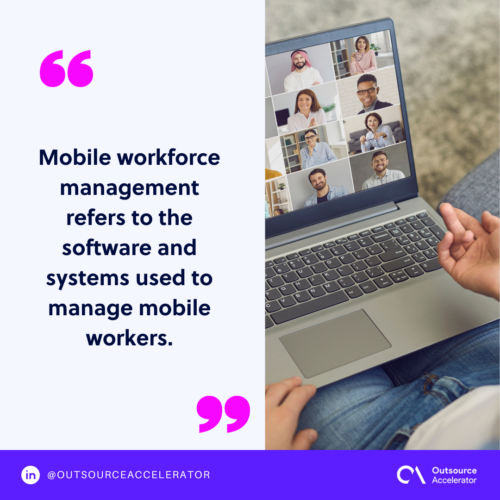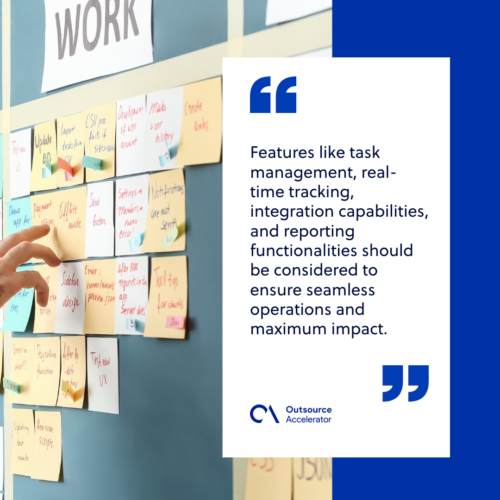Importance of mobile workforce management in business

Mobile workers, or employees with no fixed workspaces, continue to shape businesses worldwide as they continue to rise.
Figures by Statista show that the number of mobile workers in the US is expected to cover more than 90% of the workforce by 2024. With this amount, firms should learn how to manage their employees effectively through mobile workforce management.
Below is a quick guide to the importance of mobile workforce management for businesses today.
What is mobile workforce management?
Mobile workforce management refers to the software and systems used to manage mobile workers.
It handles various functions related to employee management, such as automating tasks and monitoring performance. It also ensures communication between field workers and the central office.

Benefits and challenges of mobile workforce management
Implementing a robust mobile workforce management strategy offers an equal range of benefits and challenges impacting an organization’s performance.
Benefits of mobile workforce management
Effective mobile workforce management provides the following advantages:
Enhanced productivity
Mobile workforce management enables real-time task allocation, reducing downtime and ensuring employees access relevant information in the field.
With optimized scheduling and efficient work progress tracking, field workers can focus on completing tasks, maximizing productivity.
Reduced operational costs
An optimized mobile workforce can help lower operational expenses. Efficient scheduling and route planning can minimize travel time, reducing fuel costs and vehicle wear and tear.
Additionally, automated workflows and digital documentation reduce paperwork, saving time and reducing administrative costs.
Greater employee engagement
Enabling teams to manage tasks and access information on mobile devices improves their overall employee engagement. Field workers feel empowered, with the ability to take ownership of their work and provide input in real time.
This contributes to higher job satisfaction, increased motivation, and better performance.
Challenges to mobile workforce management
Despite the benefits, organizations must also be aware of the following:
Data security and privacy
Companies must carefully consider data security and privacy regulations to manage a mobile workforce effectively. This is because employee information is prone to data breaches and cyber security issues once exposed to a low-quality system.
Technological integration
Integrating mobile workforce management tools seamlessly with existing systems and processes can be challenging.
Organizations must ensure compatibility and smooth data flow between mobile applications, backend systems, and other relevant platforms.
Training and adoption
Organizations must invest in training programs to ensure employees are up-to-date with the mobile workforce management tools. Effective change management strategies are necessary to address these challenges.
Best practices in mobile workforce management
Organizations can follow these best practices to manage a mobile workforce effectively:
Select the right mobile workforce management tools
Evaluate and choose mobile workforce management tools that align with the organization’s requirements.
Features like task management, real-time tracking, integration capabilities, and reporting functionalities should be considered to ensure seamless operations and maximum impact.

Communicate regularly
Prioritize effective communication tools, allowing consistent, real-time communication between field staff and the central office.
Chat apps and knowledge-sharing platforms are some of the effective channels to facilitate efficient collaboration and information exchange.
Maximize data for decision-making
Leverage the power of data to drive decision-making. Establish key performance indicators (KPIs) and collect relevant data to measure employee performance, identify areas for improvement, and make informed business decisions.
Refine workforce management processes
Adopt a culture of continuous improvement by regularly reviewing and refining mobile workforce management processes.
Seek feedback from employees and customers to identify areas of improvement and implement changes accordingly.
Tools for mobile workforce management
There are numerous tools available to help organizations effectively manage their mobile workforce.
Here are a few popular options:
- Hubstaff. Hubstaff provides features such as time tracking, GPS location tracking, geofencing, task management, and advanced reporting.
- Skedulo. Skedulo is a field service management platform offering features like intelligent scheduling, real-time visibility, and workforce optimization.
- Papaya Global. Papaya Global is a comprehensive solution for managing global mobility. Its features include relocation, immigration, and payroll.
- Rippling. Rippling offers tools for employee management, including onboarding, HR, payroll, benefits, and IT. This integrated platform simplifies administrative tasks and ensures centralized employee data and communication.
- ClickUp. Lastly, ClickUp simplifies workforce and project management through customizable time tracking, task management, and performance analysis.
These tools can help organizations streamline their mobile workforce management processes and optimize the performance of their field teams.
Future of mobile workforce management
As work dynamics evolve, the future of mobile workforce management looks promising. Several trends are expected to shape its development in the coming years.
AI and ML algorithms can analyze massive amounts of data, enabling organizations to automate certain aspects of mobile workforce management. This includes predicting maintenance needs, optimizing routes, and improving scheduling accuracy.

As the mobile workforce grows, ensuring data security and privacy will become even more critical. Organizations will need robust security measures and systems to protect sensitive information from cyber threats.
Lastly, employers will increasingly prioritize employee well-being by implementing mobile workforce management tools that promote work-life balance and reduce stress levels.







 Independent
Independent




